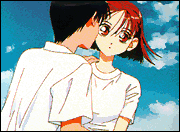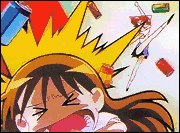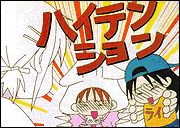 |


Copyright © 1998, 1999 Tsuda Masami, Hakusensha, GAINAX,
the KareKano Group, TV Tokyo, SOFTX










|
 |


—by Keith Rhee
Few people in the industry have generated as much controversy as Anno Hideaki,
director of the cult-favorite NEON GENESIS EVANGELION.
While EVANGELION gained
Anno and Gainax a great deal of attention and many loyal fans, the massive hype
surrounding EVANGELION—as well as Anno's
own standoffish attitude—turned off a good number of fans as well..
 For better or worse, this controversy stirred up by Anno's previous
directing effort and his own persona have influenced opinions about the recent
KARESHI KANOJO NO JIJOU ("HIS AND HER SITUATION").
Already, Anno's fans (many of whom wouldn't ordinarily touch a shoujo story)
were quick to proclaim it as the next big thing. But this reviewer had grown
tired of the hype surrounding EVA, and with the
renewed hype surrounding KAREKANO I was inclined to dismiss
the favorable comments as hype as well. Trying to postpone judgment, I
started the tape and sat back to watch. For better or worse, this controversy stirred up by Anno's previous
directing effort and his own persona have influenced opinions about the recent
KARESHI KANOJO NO JIJOU ("HIS AND HER SITUATION").
Already, Anno's fans (many of whom wouldn't ordinarily touch a shoujo story)
were quick to proclaim it as the next big thing. But this reviewer had grown
tired of the hype surrounding EVA, and with the
renewed hype surrounding KAREKANO I was inclined to dismiss
the favorable comments as hype as well. Trying to postpone judgment, I
started the tape and sat back to watch.
 The "Kanojo" of this tale is Miyazawa Yukino, an overachiever who excels at
academics and sports, and whose pretty looks, refined manners, and
accomplishments earn her a lot of popularity. But this outward display of
perfection belies the true nature of Yukino, who back at home doesn't bother
dressing nicely and exhibits a wild streak. As long as she remains popular
with her peers, she has no trouble maintaining this facade. But when she
enters high school, this much-coveted focus of attention is stolen away from
her by another overachiever, Arima Souichiro. The "Kanojo" of this tale is Miyazawa Yukino, an overachiever who excels at
academics and sports, and whose pretty looks, refined manners, and
accomplishments earn her a lot of popularity. But this outward display of
perfection belies the true nature of Yukino, who back at home doesn't bother
dressing nicely and exhibits a wild streak. As long as she remains popular
with her peers, she has no trouble maintaining this facade. But when she
enters high school, this much-coveted focus of attention is stolen away from
her by another overachiever, Arima Souichiro.
 A very dismayed Yukino declares Arima her enemy (all while maintaining
her docile outward manners, of course) and vows to reclaim the spotlight.
After acing the first round of exams and earning the praise of her fellow
classmates, Yukino feels that she's triumphed over her rival. But when Arima
graciously congratulates her, she no longer feels victorious; instead, she
becomes ashamed of her own pettiness and hypocrisy. Soon afterwards,
Yukino's facade is soon exposed to Arima when he pays an
unexpected visit to her house. Mistakenly assuming that her younger sisters are
at the door, Yukino flies out the entrance in her usual wild-mannered
fashion—and collides into a shocked Arima with a flying kick. A very dismayed Yukino declares Arima her enemy (all while maintaining
her docile outward manners, of course) and vows to reclaim the spotlight.
After acing the first round of exams and earning the praise of her fellow
classmates, Yukino feels that she's triumphed over her rival. But when Arima
graciously congratulates her, she no longer feels victorious; instead, she
becomes ashamed of her own pettiness and hypocrisy. Soon afterwards,
Yukino's facade is soon exposed to Arima when he pays an
unexpected visit to her house. Mistakenly assuming that her younger sisters are
at the door, Yukino flies out the entrance in her usual wild-mannered
fashion—and collides into a shocked Arima with a flying kick.
 Having found out Yukino's true nature, Arima isn't above exploiting her
weakness, and makes her do his school committee work in exchange for him not
exposing her. But he means well (he has a crush on her) and
getting Yukino to help out with his activities is really just an excuse for him
to spend more time with her. When Yukino decides she's had enough of this
"blackmail" and finally admits her deceit and pettiness to Arima, Arima accepts
her for who she is. More importantly, his feelings for Yukino haven't changed
even after finding out the truth. Now friends, they vow to drop
their masks and become true to themselves. Having found out Yukino's true nature, Arima isn't above exploiting her
weakness, and makes her do his school committee work in exchange for him not
exposing her. But he means well (he has a crush on her) and
getting Yukino to help out with his activities is really just an excuse for him
to spend more time with her. When Yukino decides she's had enough of this
"blackmail" and finally admits her deceit and pettiness to Arima, Arima accepts
her for who she is. More importantly, his feelings for Yukino haven't changed
even after finding out the truth. Now friends, they vow to drop
their masks and become true to themselves.
 While I'm normally not a fan of shoujo character art, the character designs,
cleaned up from the more flowery manga drawings, are clean-cut and rather
appealing. But the overall presentation of the show often walks a fine line
between the artistic and the cheap. Sometimes it manages to work well, even if
it's just a handful of still character shots with word balloons over their
heads. But some of the other stuff really made me cringe, such as the use of
black and white location shots that smack of a cheap photocopier. Some will no
doubt try to justify some of the techniques employed as "stylistic." But the
production values really start to suffer towards the end of the series, with
rampant cel-recycling, still-frames, and pages reprinted from the manga
accompanied by nothing but moving mouths. It gets so bad after a while that one
half-expects Gainax to pull out the "chair and spotlight" trick employed in the
last two episodes of EVA. While I'm normally not a fan of shoujo character art, the character designs,
cleaned up from the more flowery manga drawings, are clean-cut and rather
appealing. But the overall presentation of the show often walks a fine line
between the artistic and the cheap. Sometimes it manages to work well, even if
it's just a handful of still character shots with word balloons over their
heads. But some of the other stuff really made me cringe, such as the use of
black and white location shots that smack of a cheap photocopier. Some will no
doubt try to justify some of the techniques employed as "stylistic." But the
production values really start to suffer towards the end of the series, with
rampant cel-recycling, still-frames, and pages reprinted from the manga
accompanied by nothing but moving mouths. It gets so bad after a while that one
half-expects Gainax to pull out the "chair and spotlight" trick employed in the
last two episodes of EVA.
 The fact that the story of KARESHI, KANOJO NO JIJOU manages to overcome the
varying production quality is a testament to how good the story really is. The
show is uproariously funny, and the moments of random wackiness are almost
worth the price of admission alone. The scene where Yukino goes on a rampage
and employs her Mazinger Z Flying Shoe trick is priceless. But the show sets
itself apart from most run-of-the-mill romantic comedies on a more fundamental
level. There's no love triangle to speak of—you already know that
Yukino and Arima are going to be paired up and stay that way. Instead,
the show is about positive change, and how love can change a person for
the better. The fact that the story of KARESHI, KANOJO NO JIJOU manages to overcome the
varying production quality is a testament to how good the story really is. The
show is uproariously funny, and the moments of random wackiness are almost
worth the price of admission alone. The scene where Yukino goes on a rampage
and employs her Mazinger Z Flying Shoe trick is priceless. But the show sets
itself apart from most run-of-the-mill romantic comedies on a more fundamental
level. There's no love triangle to speak of—you already know that
Yukino and Arima are going to be paired up and stay that way. Instead,
the show is about positive change, and how love can change a person for
the better.
 And in the case of Yukino, the changes are quite drastic. Not only does
she drop the facade she used to treasure so much, she even develops enough
humility to admit her past hypocrisy in front of
her classmates. And in so doing, she is able to develop true friendships for
the first time in her life. Over time, the girl who starts out as a
conceited, attention-hungry, and petty individual
becomes a truly likable, beautiful person. It is this message of positive
change that makes KAREKANO so powerful. And in the case of Yukino, the changes are quite drastic. Not only does
she drop the facade she used to treasure so much, she even develops enough
humility to admit her past hypocrisy in front of
her classmates. And in so doing, she is able to develop true friendships for
the first time in her life. Over time, the girl who starts out as a
conceited, attention-hungry, and petty individual
becomes a truly likable, beautiful person. It is this message of positive
change that makes KAREKANO so powerful.
 In the end, KARESHI, KANOJO NO JIJOU turned out to be a great show. Whether
you think Anno and Gainax did a good job of bringing this story to life on
TV,
or whether you think the story was able to shine despite the sometimes
lacking production values, will probably depend on where you stand on the Anno
debate. But the comedy and the touching story more than make up for any
shortcomings in the presentation. And in the end, that's what really
matters. In the end, KARESHI, KANOJO NO JIJOU turned out to be a great show. Whether
you think Anno and Gainax did a good job of bringing this story to life on
TV,
or whether you think the story was able to shine despite the sometimes
lacking production values, will probably depend on where you stand on the Anno
debate. But the comedy and the touching story more than make up for any
shortcomings in the presentation. And in the end, that's what really
matters. 
Where to buy |
 |


